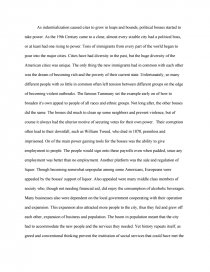Age of the Bosses
Essay by review • November 13, 2010 • Essay • 449 Words (2 Pages) • 1,445 Views
As industrialization caused cites to grow in leaps and bounds, political bosses started to take power. As the 19th Century came to a close, almost every sizable city had a political boss, or at least had one rising to power. Tons of immigrants from every part of the world began to pour into the major cities. Cities have had diversity in the past, but the huge diversity of the American cities was unique. The only thing the new immigrants had in common with each other was the dream of becoming rich and the poverty of their current state. Unfortunately, so many different people with so little in common often left tension between different groups on the edge of becoming violent outbreaks. The famous Tammany set the example early on of how to broaden it's own appeal to people of all races and ethnic groups. Not long after, the other bosses did the same. The bosses did much to clean up some neighbors and prevent violence, but of course it always had the ulterior motive of securing votes for their own power. Their corruption often lead to their downfall, such as William Tweed, who died in 1878, penniless and imprisoned. On of the main power gaining tools for the bosses was the ability to give employment to people. The people would sign onto these payrolls even when padded, since any employment was better than no employment. Another platform was the sale and regulation of liquor. Though becoming somewhat unpopular among some Americans, Europeans were appealed by the bosses' support of liquor. Also appealed were many middle class members of society who, though not needing financial aid, did enjoy the consumption of alcoholic beverages. Many businesses also were dependent on the local government cooperating with their operation and expansion. This expansion also attracted more people to the city, thus they fed and grew off each other, expansion of business and population. The boom in population meant that the city had to accommodate the new people and the services they needed. Yet history repeats itself, as greed and conventional thinking prevent the institution of social services that could have met the new needs and the governments began to loose control. The men who rose to power as the boss of their city were more than often a common man at birth who immigrated and seized the opportunity presented by industrialized cities. The bosses no longer exist today since public education has made for the smarter voter. Few immigrants with nothing to loose and
...
...

